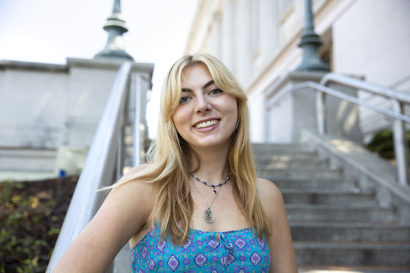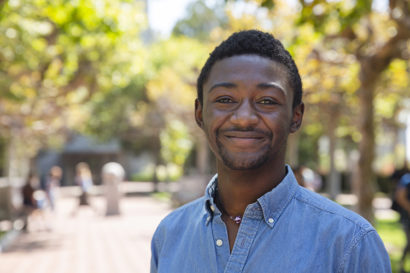Circle Up: A support group for students, by students
For students impacted by domestic violence, substance addiction and the prison industrial complex, Circle Up will hold its first in-person meeting on Oct. 22
October 19, 2021

Mythis Zamalea (left), Emma Gerson and Elias Nepa are co-leaders of Circle Up, a support group for students impacted by domestic violence, substance addiction and the prison industrial complex. (UC Berkeley photo by Sofia Liashcheva)
When student Emma Gerson first got to UC Berkeley in 2019, it was a big transformation. And transformations, she said, can often bring up unwanted emotions.
“Coming from a happy, healthy home to a dorm is a huge transition,” said Gerson, now a third-year majoring in American studies. “Coming from a chaotic or dangerous or violent home to a dorm is insane. I was struggling a little bit to find my place.”

After Emma Gerson came to Berkeley as a first-year student in 2019, she started Circle Up, a peer-to-peer support group for students, by students. (UC Berkeley photo by Brittany Hosea-Small)
Toward the end of her first week, though, she met another student in her dorm with a similar background to hers and began to feel more at home on campus.
“Meeting someone who had a similar upbringing as me, who could kind of get what I had gone through, made me feel like I wasn’t alone — and it grounded me,” said Gerson. “It’s often said that healing is not linear, but I also think that healing does not happen in isolation. Community is so important, especially when you’re coming to a new place.”
Gerson began to work with the ASUC to promote access to mental health services on campus. In doing this work, she found that many students had been affected by domestic violence, but felt they didn’t have a space where they could connect with each other.
All this got Gerson thinking: How many students on campus were affected by domestic violence? She started doing research and realized that the problem was much bigger than she thought.
She found that at least one in four college students in the U.S. report having experienced domestic violence as children. And that this trauma can negatively impact their ability to succeed in academia. While there were already trauma-informed resources on campus that students could access, Emma wanted to create a more casual safe space where students could meet regularly and support one another in a low-pressure environment.
So, like a true Berkeleyan, she started one. It’s called Circle Up.
“Circle Up is a peer-to-peer support group for students, by students,” said Gerson. “We believe that each of us holds the solutions to our problems, and has the ability to be a home for ourselves and for others. Having a community of people who can understand where you’ve been can help you find where you’re going.”
Circle Up began meeting virtually in fall 2020 as a support program for students affected by domestic violence and substance addiction. This year, after COVID-19 restrictions eased, and the campus opened back up, the group began to meet in person and has expanded to include those who are system-impacted by the prison industrial complex.
Linked to the campus’s Restorative Justice Center, Circle Up borrows a lot of the guiding principles of restorative justice, a practice that centers on the belief that strong communities are essential in preventing harm from happening. Two of Circle Up’s leaders — Elias Nepa and Mythis Zamalea — are undergraduate student leaders for the center.
While the curriculum is written by Gerson, Nepa and Zamalea, it’s also written by the larger Circle Up group. “We’re in constant conversation together as a group about what we need to be talking about, what we need to be addressing and what our goals are. Our curriculum is very flexible — it’s always changing and developing.”
At each meeting, the group sits in a circle, has a check-in, gives a land acknowledgement, and then leaders introduce guiding questions. They might discuss concepts like boundaries, self-love versus self-care, or what survivorship means and how it shows up in their lives.

Elias Nepa, a fourth-year student in sociology, said Circle Up is open to all students. “We, as a group, want to reach out to as many people as possible or have as many people as possible feel comfortable showing up,” said Nepa. (UC Berkeley photo by Brittany Hosea-Small)
“Survivorship is a huge word,” said Circle Up co-leader Nepa, a fourth-year sociology major who first got involved with supporting students two years ago as part of the ASUC’s Intimate Partner Violence Commission. “Survivorship comes up in different conversations related to domestic violence, sexual violence, substance abuse, the prison industrial complex, etc. A lot of people are survivors of a lot of instances or institutional harms or even personal violences.”
And, Nepa added, it’s important to the team that they recognize people’s different positionalities, and how these social and political contexts that shape their identities might inform what they feel comfortable sharing about themselves and what they’re able to emotionally respond to.
“When it comes to thinking about queerness and gender-nonconforming people — that is a huge community that does suffer from these different issues at exorbitant rates,” said Nepa. “These are very human problems. We, as a group, want to reach out to as many people as possible or have as many people as possible feel comfortable showing up.”
While the group might discuss heavy topics, Gerson wants to make clear that the team isn’t made up of mental health professionals. The goal of Circle Up, she said, isn’t to address and treat trauma and open up emotional wounds, but to create a space of support — although people are welcome to share as much as they feel comfortable with.
“There’s absolutely no pressure,” said co-leader Zamalea, a third-year student in psychology. “Don’t feel like you have to come into the space with the expectation that we want you to work through certain things, and we want you to get to a certain place. Even if we’re going around and all talking, there’s absolutely no pressure to even say a word. If you just want to be there and just hear what people are saying and just exist, by all means, that’s welcome.”

For Mythis Zamalea, Circle Up is a way to help his peers better understand how their experiences have shaped who they are — work that he began to do when he got to Berkeley in 2019. (UC Berkeley photo by Sofia Liashcheva)
For Zamalea, Circle Up is a way to help his peers better understand how their experiences have shaped who they are — work that he began to do when he got to Berkeley in 2019.
“Growing up, in elementary school I had coaches and teachers who had certain ideas of me,” said Zamalea. “I was constantly singled out when there were altercations with students, and I didn’t know why. I grew up thinking I was a bad kid. When I got to Cal, I learned about the school-to-prison pipeline and started to make sense of it all.”
“Even though we may all be from different backgrounds and have different experiences,” he continued, “being able to share that vulnerability just made it better because I still hold it in my chest. Even now, I’m still trivializing it, when it has actually kind of made me who I am.”
Almost everyone, said Gerson, has been affected by domestic violence, substance addiction or the prison industrial complex in some way, even if not directly. And at Circle Up, all students are welcome.
“We really welcome everyone into these groups, whether they’ve had these experiences or not — if they’re just there because they want to listen, if they’re just there because they have some sort of adjacent experience that they want to share,” said Gerson. “That’s what we’re about: just opening up this conversation, opening up the visibility for these students.”

“Being able to talk about these things, to feel like you have a voice and that you’re not invisible and that your experiences are not singular, I believe can really help break generational cycles of violence,” said Gerson. (UC Berkeley photo by Brittany Hosea-Small)
Circle Up will meet on Fridays from 5 p.m. to 6:30 p.m. The first in-person meeting will be held on Oct. 22 in Room 130 of Dwinelle Hall, although the location will change each week. The Circle Up team will send an update to members every week with the upcoming location. There’s no requirement to attend every meeting — students are welcome to join whenever they can.
Learn more about Circle Up and fill out a form to sign up.
Find more UC Berkeley resources: